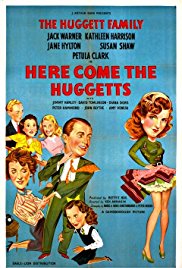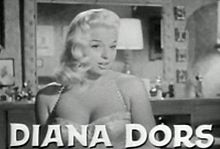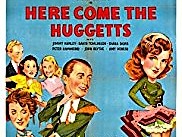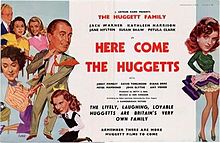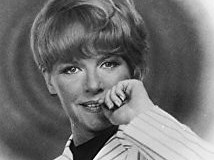Here Come the Huggetts *** (1948, Jack Warner, Kathleen Harrison Jane Hylton, Susan Shaw, Petula Clark, Jimmy Hanley, David Tomlinson, Diana Dors) – Classic Movie Review 6977
Here Come the Huggetts is the movie return of the Huggett family, first on screen in Holiday Camp (1947), and this time they are having their first phone installed, while dad is busy with his job as a factory foreman and big sister is juggling romances.
A forerunner of the British TV soap opera, director Ken Annakin’s 1948 comedy drama brings back the flavour of its late Forties time and place perfectly. The characters were created by Godfrey Winn, author of the multi-drama story of Holiday Camp (1947), which originally introduced The Huggetts.
In the screenplay by Mabel Constanduros, Denis Constanduros, Muriel Box, Sydney Box and Peter Rogers, the life of a British post-war working-class family in all its glory is upset by the arrival of their tarty, outgoing, blonde niece Di (a 16-year-old Diana Dors).
Jack Warner and Kathleen Harrison give archetypal, entertaining performances as dad and mum at the head of a delightful ensemble of players, compensating for the rather weak screenplay, which is merely a series of incidents strung together with fairly feeble dialogue.
Warner and Harrison play Joe Huggett and his wife Ethel, Petula Clark, Jane Hylton and Susan Shaw play their daughters (with the same first names as the actresses) and Amy Veness plays their bossy grandma.
Warner, Harrison, Dors, Hylton, Shaw, Clark, Jimmy Hanley, Peter Hammond and David Tomlinson are the most familiar and deservedly popular faces, and this family format proved so popular that the Huggetts reappeared in two further films, Vote for Huggett and The Huggetts Abroad, both 1949. Annakin directed all the films in the series.
Also in the cast are John Blythe, Amy Veness, Clive Morton, Maurice Denham, Doris Hare, Esma Cannon, Alison Leggatt, Dandy Nichols, Hal Osmond, Peter Scott and Keith Shepherd.
The film is also a fore-runner of the British TV and film comedies like On the Buses and Till Death Us Do Part, and appropriately features the actresses playing the mums in those, Doris Hare and Dandy Nichols.
Here Come the Huggetts is directed by Ken Annakin, runs 93 minutes, is a Gainsborough Pictures production, and a General Film Distributors release, is written by Mabel Constanduros, Denis Constanduros, Muriel Box, Sydney Box and Peter Rogers, is shot in black and white by Reginald H Wyer, is produced by Betty E Box, and is scored by Antony Hopkins.
Petula Clark, who began her career as a child vocalist at the age of 11 on BBC radio, singing for the troops during World War Two, sings the song ‘Walking Backwards’, by Jack Fishman and Peter Hart.
On a £100,000 budget, it took £127,000 at the box office.
© Derek Winnert 2018 Classic Movie Review 6977
Check out more reviews on http://derekwinnert.com

